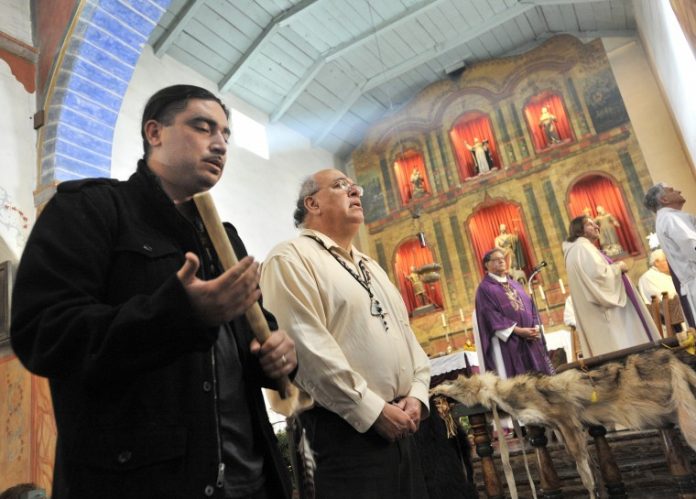
The day of Dec. 22, 2012 will go down in the millennia-long history of the Amah Mutsun Tribal Band of Ohlone/Costanoan Indians as a day of healing.
The Catholic Diocese of Monterey on Saturday formally apologized to the Mutsun in a public Mass of Reconciliation for the Church’s abuses against the tribe as far back as 1797, when Franciscan monks began to colonize parts of California.
For tribal Chairman Valentin Lopez, 61, the date marks the culmination of a hard-fought effort to reconcile the violent past of the now-serene Mission San Juan Bautista, as well as milestone in the process of coming to terms with an identity crisis that has plagued the group of Native Americans for generations.
“Many of our tribe members are Catholic themselves,” Lopez said. “So the apology gives them a chance to reconcile their religious identity with their tribal heritage.”
Principally associated with Mission San Juan Bautista and the surrounding areas of Hollister and Gilroy, the Mutsun occupied the San Juan Valley “long before the Spanish arrived in the late 1700s,” as noted on the tribe’s website.
On Saturday, rain poured down on the tiny historic town of San Juan Bautista – which lies just west of Hollister – prior to the first part of the ceremony, which featured a display of traditional Mutsun song and dance at a community center near the mission. More than 200 people showed up for the dance; an activity the Mutsun consider a form of prayer. Incense of sage, bay leaves, tobacco and mugwort permeated the room, symbolically floating those prayers to heaven, Lopez explained.
Immediately after the ceremony, Bishop Richard Garcia of the Monterey Catholic Diocese led a mass in the mission chapel, where more than 300 people heard him apologize for crimes including slavery, rape and genocide committed against the Mutsun and other tribes hundreds of years ago. Historical unpleasantries such as widespread diseases, death and the destruction of the Mutsun’s sacred landmarks by Spanish soldiers, have been somewhat glossed over, or for the most part “ignored” by the mission, said Lopez earlier.
That trend took a turn for the better Saturday.
“Brothers and sisters, I ask for forgiveness for the times when individuals and communities of our Catholic Church have disrespected you, have abused you, and I apologize,” said Garcia to a chapel packed with Native Americans from several area tribes. The audience sat in pews inside the ornate mission sanctuary, which was heavy with the smoky aroma of burning herbal incense.
Saturday was the first time that leaders of Mission San Juan Bautista and the Monterey Catholic Diocese publicly confessed to the atrocities that nearly wiped out the Mutsun. It was also the second time that a Catholic Church leader formally apologized to another one of California’s indigenous tribes.
Five years ago, a retired bishop in San Rafael apologized to a band of Miwoks (indigenous Northern Californians with 5,000-year-old Bay Area roots) for past crimes against their tribe. Garcia and Lopez said they are unsure whether the two reconciliation events in San Rafael and San Juan Bautista will set an example for more of the same in California and across the nation.
“At times, we have been broken and broke others out of a lack of respect,” said Bishop Garcia during the mass. “I ask your forgiveness … I apologize for all the times the Catholic Church has hurt you.”
The sun beamed through the high-up windows as the bishop delivered his speech – a part of the mass that brought some in the audience to tears and struck Lopez as symbolic, he later said. The tribal chairman accepted the apology, exchanged gifts with the bishop and spoke of a future of healing and solidarity.
Garcia took time during the service to mention the recent canonization of the first Native American saint, Kateri Tekakwitha, an Algonquin-Mohawk woman who lived in what is now New York State.
“The service was really emotional and powerful,” Garcia later noted. “Our elders, particularly, talked about how important the apology was and how overdue it was and how happy they were to see it happen in their lifetime.”
The reinforced partnership with the Catholic Church, additionally, will give the Mutsun an ally in its decades-long effort to become a federally recognized tribe. The Mutsun’s lack of a federal or state tribal status – achieved through a tedious bureaucratic process riddled with stringent criteria – means they have no claim to job training, healthcare, land or education assistance from the state.
The tribe is currently No. 1 (?) in line out of a long list of Native American groups that have filed petitions for federal recognition.
In the interim, the Mutsun members are taking it one milestone at a time.
“The apology was more than we expected,” said 53-year-old Mutsun tribesman Edward Morillo, whose family claims deep roots in the San Juan Bautista community. “A total apology and the bishop asking our forgiveness – it was deeply touching.”
An apology, for that matter, was beyond what the Mutsun initially requested, according to Lopez.
“When I approached the bishop about this for the first time four years ago, I asked for four things: A resolution acknowledging us as a legitimate historic tribe of San Juan Bautista, a museum room in honor of the Mutsun at the mission to remember their history, that the Indian burial site be marked and treated with proper respect and, finally, access to genealogy records kept by the Church,” Lopez explained.
It took years of no response before the bishop, earlier this year, agreed to those four stipulations. Then, Garcia proposed two more: That the mission hold a formal ceremony of reconciliation and that Lopez speak in January at a retreat to every priest in the Monterey Diocese about the history of the Mutsun and other tribes.
“I was floored,” Lopez said. “Of course I agreed. This is the beginning of good things for us.”









